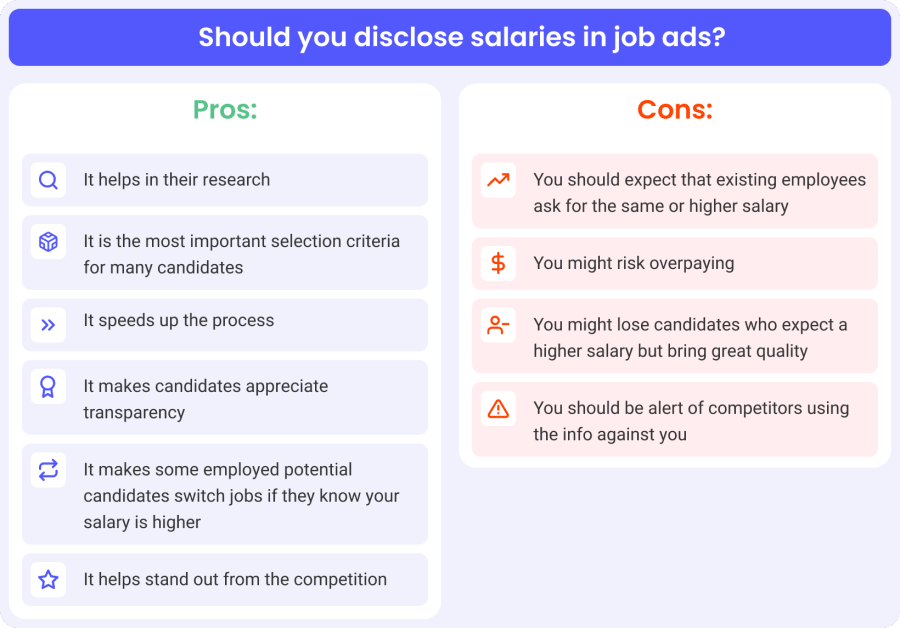As things change in hiring nowadays, more so in the software industry than any other, the compensation is undoubtedly still the main deciding factor when a candidate says yes to a job offer.
Sure, company culture, flexible working hours, and remote options are perks that might make the final tip in the direction of accepting, but at the end of the day, working is an age-old transaction in which one gets money for what they do.
So, should you disclose compensation in your job descriptions? Let’s go through the pros and cons.

The pros
Immediately standing out from the competition, and speeding up the hiring process, are two big enough reasons to disclose the compensations. But, here are some other valid arguments why it might be a good idea.
Job seekers will try to find out one way or another
If the job posting doesn’t include the compensation, potential candidates will surely investigate on their own and find some clues about what to expect. Glassdoor, LinkedIn, or similar job platforms sometimes contain data about the size, employer brand, and countries where the company has offices, and then deduct what they could expect from that information.
By publicly stating how much you’re willing to compensate candidates, you might speed up their search and win their sympathies.
It is often the first deciding criteria for many qualified candidates
Candidates will more easily decide if a job offer fits their experience and standard of living when they can see the salary.
In the first contact with recruiters, it is common practice for candidates to discuss their compensation so that the people that don’t fit the hiring budget are eliminated and don’t make it to the next step. You might as well not beat around the bush and save both the candidates and the recruiters some time by being upfront early on.
You will speed up the hiring process
As mentioned before when you eliminate the people who won’t find the compensation suitable for them, they won’t even apply for the job. That means fewer resumes to read through, hours and hours saved on pre-screens, and the time the candidates they’d spend on doing technical tests and assignments too.
People appreciate transparency
Job seekers more than ever respect openness and friendly culture over a corporate and secretive environment. Equality and diversity, together with transparency, are some of the most valued characteristics for potential new team members.
Qualified applicants that are happy with their job could likely leave for a higher compensation
It isn’t uncommon in the software industry that a person switches jobs solely because of a better compensation, even though they were happy at their previous company. For those casual job seekers out there, seeing that you offer a higher compensation might make a difference and nudge them in your direction.
It helps you stand out from competitors
If you’re one of the rare companies publicly disclosing the compensation range, you will have a head start in attracting many potential applicants. It is also a good idea if you are still building your employer brand, but don’t have to save on the hiring budget.
The cons
There are two sides to every coin, and the reasons why many companies in fact don’t display the compensation right away might be bigger than the pros.
You might have to level the compensations of existing team members
If the compensation history of a current member goes on for months or years, yet your company offers a higher compensation than what they started with for the newcomer, they will probably be discontented. And if they still make less, you risk losing a good team member and piling turnover costs on top of that.
You might risk overcompensating
When the ball is always in your court, you don’t see what a candidate expects and hopes for from a compensation. If they immediately sense that you are willing to pay more, they will accept your offer, even though they would go even for less.
It is possible you lose out on someone that expects a better compensation but also brings great quality
If you are willing to pay an excellent candidate more because they bring a lot to the table, yet they didn’t even apply for the job because of the set compensation range, you lose out on a good long-term investment with a great potential member.
If your biggest competitors in hiring know how much you are paying for a given position, they can post a similar job ad with a higher compensation and steal your potential candidates.
How to create a winning team culture for modern tech teams
Learn to build and nurture cohesion, trust, and culture in hybrid and distributed teams.
Takeaway
Whether or not you disclose the compensation range from the very beginning in the job ad depends on your policies, budget, location (in some countries, it’s illegal not to do it), and openness to negotiations.
If you operate remotely, there are many factors that can affect the candidates’ expectations about the compensation. Standards and costs of living differ from country to country, and you need to weigh in all options prior to talking them through with applicants.
So, make sure to weigh all the pros and cons before you decide what’s best for you. And make sure to research what the competitors are doing too.






